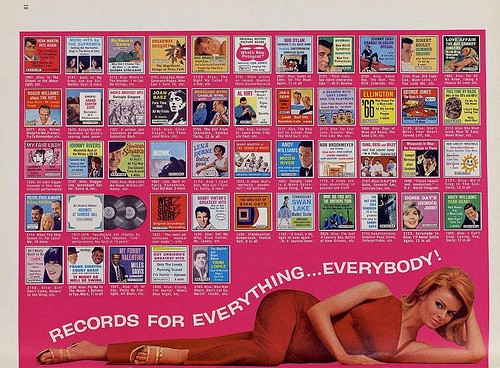Columbia House has been around since 1955, sending records and then CDs directly to customers’ doors.
But today’s culture is filled with instant media, making Columbia House an outdated concept. The 60-year-old company filed for Chapter 11 bankruptcy this past week, citing declining revenue over the past two decades for the decision.
In 2014, Columbia House earned just $17 million, compared with peak net income of $1.4 billion in 1996.
For those not familiar with the little postcards you found in magazines, Columbia House had a complicated, and some may say, questionable, business model. It lured customers in by promising them eight or 12 CDS (or casette tapes or records) for a mere penny.
But by signing up, customers were subscribed to a multi-year contract in which they had to purchase a set number of overpriced albums before they could opt out.
To make a profit, Columbia charged close to double the average retail cost for the same piece of media.
These lofty fees, and the monthly mailings that offered only music from companies with which Columbia House had contracts, were confusing. But in a day and age before Paypal and instant media streams, some users found ways to game the system.
They would fraudulently sign up for Columbia House using false information to get their initial shipment of practically free music, and then be off the hook for the long-term contract, since the names they used didn’t exist.
In the past few years, the company has largely focused its efforts on delivering DVDs to homes, but found that owning physical copies of music and movies is becoming an increasingly outmoded phenomenon.
With the popularity of streaming services like Spotify (which had revenue above $1 billion in 2014) and Netflix (which reported $5.5 billion in revenue last year) or digital downloads via VOD, iTunes or Amazon Instant, Columbia House couldn’t compete in the marketplace.
iTunes is likely never going to offer 12 album downloads for a penny, but the ability to immediately access just the song that you like for $1.29 or less if you have a subscription, is much more appealing. Teens don’t have to beg their parents for money for music they don’t even really want. And there’s no long-term commitment to be concerned about.
For story ideas, see whether Columbia House had many users in your area. You can ask readers to post their memories, good and bad, of dealing with it. How popular are streaming services where you live? What are the most popular movies and recordings in your area?











